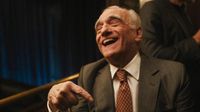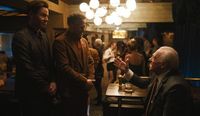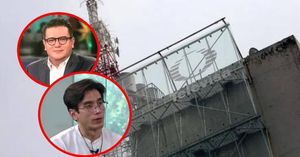Seth Rogen's new Apple TV+ comedy series, The Studio, has made waves with its satirical take on Hollywood, featuring an impressive lineup of cameos, including the legendary Martin Scorsese. The series, co-created by Rogen and Evan Goldberg, premiered on March 26, 2025, and has already garnered attention for its unique storytelling approach and its critique of the film industry.
In The Studio, Rogen plays Matt Remick, a newly appointed head of the fictional Continental Studios. This ambitious character is not just a fan of cinema but is also tasked with the daunting responsibility of making money for the studio, often at the expense of artistic integrity. His first major project is a “Kool-Aid” movie, a concept that reflects the commercial pressures faced by studios today.
As Matt navigates his new role, he finds himself in a meeting with none other than Martin Scorsese, who appears as himself. Scorsese pitches a film about the infamous Jonestown massacre, a project that Matt initially finds promising. He offers Scorsese a staggering $250 million budget and $10 million for the screenplay, hoping to merge high art with commercial viability. However, the irony unfolds when Matt ultimately decides to scrap Scorsese's project in favor of a more family-friendly film, leading to an emotional moment where Scorsese is brought to tears at a party hosted by Charlize Theron.
This poignant scene not only highlights the absurdities of the Hollywood machine but also serves as a commentary on Scorsese's own criticisms of the film industry. In a 2019 op-ed for the New York Times, Scorsese expressed his disdain for superhero films, stating, "Cinema is an art form that brings you the unexpected. In superhero movies, nothing is at risk." The decision to pivot from Scorsese's serious film to a light-hearted Kool-Aid project embodies the very fears he articulated about the industry's direction.
Rogen's portrayal of Matt Remick is marked by his starry-eyed enthusiasm for cinema, which starkly contrasts with the harsh realities of his new position. As he grapples with the demands of his corporate overlord, Griffin Mill, played by Bryan Cranston, Matt's journey reflects the internal conflict many creatives face in an industry increasingly driven by profit. Rogen's character is not alone in this struggle; his friend and associate, Sal Saperstein, portrayed by Ike Barinholtz, serves as a comedic foil, embodying the pressures and absurdities of studio life.
Barinholtz shared his excitement about Scorsese's involvement, recounting his reaction when Rogen informed him that the Oscar-winning director would appear on the show. "F--k you," was Barinholtz's immediate response, emphasizing the weight of having such a cinematic icon in their midst. He described Scorsese as not only a personal hero but also a genuinely kind individual who loves discussing films.
Throughout the series, the blend of real-life personalities with fictional narratives creates a unique viewing experience. The cameos from industry giants like Steve Buscemi, Charlize Theron, and Sarah Polley add layers of authenticity to the satire. Rogen and Goldberg crafted the roles with specific intentions, ensuring that each guest star contributed meaningfully to the story. Goldberg noted that Scorsese's participation was secured simply by him reading the script and agreeing to join, a testament to the show's compelling narrative.
Filming The Studio presented its own challenges, particularly with the decision to shoot scenes in long, unbroken takes, known as “oners.” Rogen admitted that directing Scorsese under these conditions was nerve-wracking, especially since they had only one chance to get it right. To mitigate potential issues, they even had a second camera crew on standby, illustrating the high stakes involved in capturing Scorsese's performance.
Despite the pressures, Scorsese embraced the format, delivering a remarkable performance that showcased his comedic timing. Rogen expressed gratitude for Scorsese's willingness to adapt to their unconventional shooting style, stating, "He was so funny, and I feel like he gave me a very unwarranted gift." This collaborative spirit reflects the camaraderie that can exist in the film industry, even amidst its competitive nature.
The first two episodes of The Studio not only entertain but also provoke thought about the state of cinema today. The juxtaposition of high art and commercial interests is a central theme, encapsulated in Matt's journey as he tries to balance his love for filmmaking with the realities of studio demands.
As the series progresses, viewers can expect more layers of satire and insight into the entertainment world. Each episode promises to delve deeper into the absurdities of Hollywood while showcasing the talents of its star-studded cast. With new episodes released weekly, audiences have the opportunity to witness the evolution of Matt Remick's character and the challenges he faces in an industry that often prioritizes profit over passion.
In a landscape where the lines between art and commerce continue to blur, The Studio stands out as a bold exploration of the complexities of filmmaking. Rogen and Goldberg have crafted a narrative that resonates with anyone who has ever loved cinema, making it a must-watch for film enthusiasts and casual viewers alike.
The show’s unique blend of humor and critique invites reflection on the future of storytelling in Hollywood, where the dreams of filmmakers can sometimes be overshadowed by the demands of the box office. As Rogen aptly puts it, "I got into all this because I love movies. But now I have this fear that my job is to ruin them." This sentiment encapsulates the heart of The Studio and the ongoing tension within the industry.








